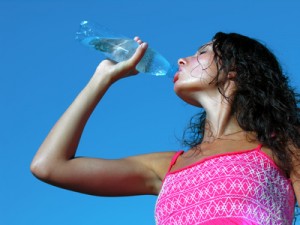You’ve always heard that you have to drink so much water in a day, that water is very good for you, and so on. A lot of people don’t realize just how important water is! Your body is 73% water. Throughout your day, as you work, play, exercise, or plain just loaf around – you’re losing water. Now you get water from food and other drinks, but nowhere near the amounts required to be healthy. That’s why water is so crucial! If you lose more fluid than you take in, your body struggles to complete basic functions. Not replacing those fluids will get you dehydrated.
The most common ways you can get dehydrated are intense exercise (particularly in hot environments), severe vomiting or diarrhea, or sweating a lot due to fever. Drinking alcohol can also cause you to be dehydrated, as alcohol is a diuretic – it pulls more water from your body. Ever notice how often you go to the bathroom while drinking? Children, the chronically ill, and the elderly are at the highest risk for severe dehydration.
Luckily – up until a certain point, you can relieve the symptoms of dehydration by hydrating. Drink plenty of water, but if your body is hot, do not drink a lot of very cold water all at once. You will make yourself vomit. Sip it slowly, or drink room temperature water. Prevention is the easiest way to handle it. Hydrate during any activity that causes you to sweat and you should be ok! Symptoms of mild dehydration to watch out for include:
- Thirst
- Tiredness
- Headache
- Dry skin
- Sticky or dry mouth
- Reduction in urine output
- Light-headed or dizziness
- Constipation
If you find yourself suffering from severe dehydration, you’ll need intravenous fluids. It will be an IV of a sodium chloride solution that will alleviate your discomfort and get you back on your feet.
Symptoms of severe dehydration are as follows:
- Extreme thirst
- Extreme fussiness or sleepiness in infants and children; irritability and confusion in adults
- Very dry mouth, skin and mucous membranes
- Little or no urination — any urine that is produced will be darker than normal
- Sunken eyes
- Shriveled and dry skin that lacks elasticity and doesn’t “bounce back” when pinched into a fold
- In infants, sunken fontanelles — the soft spots on the top of a baby’s head
- Low blood pressure
- Rapid heartbeat
- Rapid breathing
- No tears when crying
- Fever
- In the most serious cases, delirium or unconsciousness
If you experience a combination of these symptoms, you need to come to the urgent care. We can evaluate your level of dehydration, and if necessary, hook up an IV to get some fluids restored. If you’re unsure of how dehydrated you are, give us a call!

